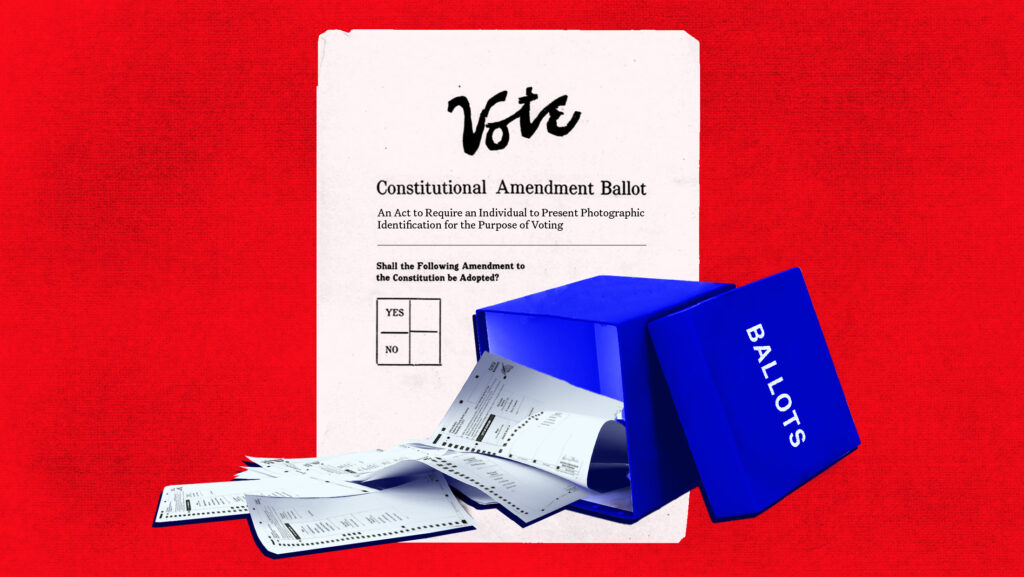Maine Republicans Are Asking Voters to Restrict Their Own Rights

Maine’s state motto, “Dirigo,” or Latin for “I direct,” reflects the state’s history as a guide for the country. As the phrase went at the time, “Where Maine goes, so goes the country.”
These days, though, Maine seems not to be leading the country but following it. In November, Mainers will be faced with a ballot initiative that would radically restrict voting rules in the state, and which is modeled after restrictive voting laws passed in Ohio, Georgia and elsewhere.
If approved by voters, the measure would impose onerous new voting restrictions, including requiring government-issued photo ID, cutting two days of absentee voting, banning absentee ballot requests made by phone, requiring seniors to re-apply to vote absentee, and limiting the number of dropboxes available to voters.
State Rep. Laurel Libby, a GOP rising star who is considering a run for governor, was instrumental in getting the measure on the ballot. Libby and her former campaign manager Alex Titcomb turned to the initiative process after failing to advance multiple voting bills in the legislature, which is controlled by Democrats.
Last year, Titcomb organized a low-budget, grass-roots petition effort that ultimately collected 171,000 signatures, well beyond the required 67,000, to get the measure on the ballot.
Titcomb sought to frame the measure, misleadingly, as being solely about the photo ID requirement, which for multiple reasons tends to be popular with voters. In fact, pro-voting advocates have noted that 27 separate provisions in the measure would change how the state conducts absentee voting — which was used by nearly 40% of Maine voters last year.
Secretary of State Shenna Bellows (D), who is running for governor next year, approved ballot language that didn’t hide the major impact the initiative would have on absentee voting. It asks voters:
Do you want to change Maine election laws to eliminate two days of absentee voting, prohibit requests for absentee ballots by phone or family members, end ongoing absentee voter status for seniors and people with disabilities, ban prepaid postage on absentee ballot return envelopes, limit the number of drop boxes, require voters to show certain photo ID before voting, and make other changes to our elections?
Titcomb filed a lawsuit challenging that language, but Maine’s highest court ruled earlier this month to uphold it.
In an interview, Titcomb acknowledged that the referendum was not prompted by pervasive election fraud. In fact, he doesn’t dispute that there have been less than a half dozen election fraud convictions in nearly fifty years in Maine. So why the need to dramatically change the system?
“The heart of this is that it’s future-looking,” Titcomb said. “We’re not saying there’s an urgent problem now. We’re saying let’s build a secure system to prevent problems from occurring later. We’ve been saying that consistently for years.”
Liz Wester, a Democratic strategist who leads the Save Maine Absentee Voting Coalition, views this as a straw man argument.
“Maine voters have shown with their consistently high turnout that they trust our voting system,” Wester said. “It’s dangerous to make laws on the basis of preventing fraud that doesn’t exist.”
The measure is in line with a broader effort by the GOP nationally to restrict mail and absentee voting. And it appears to target Democratic-leaning groups, like college students, urban residents, overseas voters, and the transient working-class.
For instance, it calls for a single dropbox for every municipality, which Titcomb called an “effort to provide an even playing field.”
But only two municipalities in the state currently host more than one drop box. Both of them, Portland, the state’s largest city, and Orono, home to the flagship campus of the University of Maine system, vote heavily Democratic. In effect, passing the measure would mean that Portland, with 69,000 people, would have the same number of dropboxes — one — as the town of Byron, population 103.
The measure is in line with a broader effort by the GOP nationally to restrict mail and absentee voting.
Titcomb shrugged. “We’re just trying to even things out,” he said.
Titcomb’s For Our Future PAC has received $375,000 in donations from a fund with ties to Leonard Leo, the influential head of the Federalist Society, who has a summer home on the Maine coast. Titcomb said Leo is not involved in the voting ballot measure, and added that he only accepts PAC contributions with “no strings attached.”
Maine has a fiercely independent streak — it’s represented by a Republican and an independent senator, despite voting for Democrats in every presidential election since 1992. But the push by state Republicans to radically tighten voting rules suggests it’s not immune from the national trends driving the party’s sweeping assault on access to the ballot.
With the referendum on the ballot this November, we will soon see how those trends play out.
Midcoast Maine resident Robert Conlin is a former newspaper and wire services reporter and editor, and the author of six books, including Life and Death at Abbey Gate: The Fall of Afghanistan and the Operation to Save Our Allies, and The Lewiston Shootings: An All-American Tragedy.